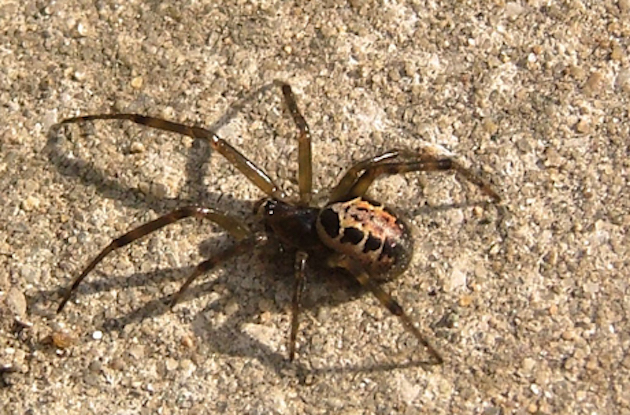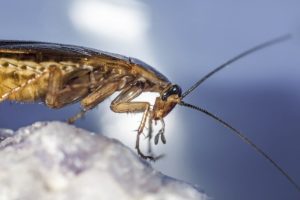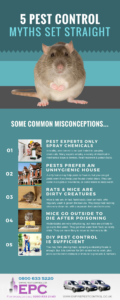The lookalikes of the infamous, deadly Black Widow Spider are their cousins, the False Widow Spider. While these spiders are venomous and can pack a very painful bite, they’re no more dangerous that being stung by a wasp. These spiders are also non-aggressive. Here we are going to look at some top tips for controlling the UK False Widow Spider.
Identifying The Spider
The False Widow is quite small. It has a body length of around 10-15mm. The males are much smaller at only 3-6mm in length. This spider is shiny black in colour and has a very round shape to its body. The only thing they lack compared to the standard Black Widow is the striking red double triangle or hourglass shaped marking.
False Widows are believed to have been introduced to the UK from the Canary Islands. This happened in the 1880s, with ships weighing anchor in Devon. The spiders have then gradually spread towards the north and east. Records now show they can be found as far afield as Pembrokeshire. This particular species of spider was introduced from a different country, but there are several species which originated here in the UK.

The most common places have been finding False Widows are in their sheds and outbuildings. However we have seen a lot of reports of schools suffering from infestations, and homes also having to deal with spider control.
It can be really tricky to identify the False Widow, even using images found online. This is why it’s so important to call in a professional pest controller if you see a spider with any kind white or red markings on its body.
Webbing And Spider Locations
A False Widow will spin a loose tangle of webbing that’s very distinct from other species. There will be a tube of silk in one corner that will lead you straight to where the spider hides during the day. These webs are typically spun at least a few meters above ground level. So, keep checking those ceiling corners, and always look up.

False Widows have been found in a number of locations. These include around windows and doors, in walls, down piping and gutters, drains, porches and sheds. The spiders numbers have been on the increase towards the end of this year as the males have been wondering looking for a mate. This is why we’ve been experiencing more call outs for False Widow pest control.
Health Risks
False Widows aren’t aggressive by nature. However, if they are provoked, they will be quick to attack. When someone is bitten by these spiders it’s normally as a result of accidental contact. For example, spiders living in unworn shoes have been disturbed by feet and have bitten in defence. The venom contained in the bite causes a short-lived reaction, likened to a wasp sting. Occasionally the reaction has lasted longer and has spread out from the area of the bite.

In the UK, people have had problems with these spider bites because of infections happening as a result of the initial skin lesion. None of these reactions have been to the venom itself, as it is considered non-lethal.
Given that these spiders have been in the UK since the 1880’s, living in our homes, the rarity of people being bitten is an indication of the very low threat from the species. The threat is actually much less than what a wasp sting would be to someone who is allergic. Or that of tick-borne Lyme disease.
Getting Rid Of False Widow Spiders
If you are having trouble with False Widow Spiders in your home, there are a few things you can do. Giving the area a thorough vacuum will remove the webs and the spiders from your home. If this isn’t possible, you may have to search for the spiders’ food source. Removing this food source will drive the spiders away to somewhere with more accessible food. This could involve fly control or using insecticidal sprays to control insect prey.
Normally for smaller infestations this should be enough to control the problem. For long term prevention, seal any potential entry points around your home. The areas to pay particular attention to are in the loft, in porches and conservatories. This will help you further reduce the chance of having to deal with a False Widow infestation, or any other pest problem.
Call Our Team To Get Advice
It’s always best to seek professional advice for False Widow problems. Typical DIY pest control methods may not work and may not be approved for use in your home. Get in touch with a professional pest controller such as Empire Pest Control to find out the best way of treating False Widows in your UK home or business.

Our team are very experienced and highly qualified. Our intensive training is second to none. We are members of the BPCA, and also affiliated with professional associations including NPTA, SAFECONTRACTOR and SAFE4SITE. We are proud to have many positive reviews. The confidence our customers have in our services speaks for itself.
If you are in London or the Home Counties and have an infestation of any type of pest, call us any time, day or night, 24 hours a day. Our customer service team are happy to give you help and advice on any topic you need on 0203 633 2143.






